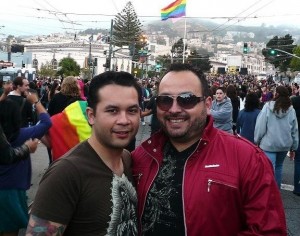What the Marriage Equality Movement Means To LGBT People of Color
-

by Lorenzo Herrera y Lozano
This week, California experienced another high in the rollercoaster of marriage equality. By declaring Prop 8 unconstitutional, Judge Vaughn Walker ignited celebrations across the country and in my home city of San Francisco. On a Wednesday night, the Castro district was alive as if it were prime Pride season.
However, the jubilee was bittersweet, given that Judge Walker attached a stay to the decision — forcing couples to wait to marry until after attorneys on both sides present further arguments. Accordingly, in a sea of celebration, LGBT couples — such as my partner and I — are continuing to wait.
As I consider walking down the aisle, I have to keep asking myself: why do I want to participate in one of the most heterosexist practices around?
In weighing the question, I’m reminded of something I once heard Evan Wolfson, Executive Director of Freedom to Marry, say: “People of color have the most to win and the most to lose when it comes to marriage equality.”
When I first heard these words, they resonated. But as I looked around the room in which they were spoken, I wondered how genuine they were. After all, we were sitting in a room of LGBT leaders of color who had been convened inside a Manhattan law firm boardroom, with Wolfson sitting at the head of the table. Taking in the scene, I had to wonder: If people of color have the most to win and the most to lose, why aren’t we at the head of this table and of the LGBT movement?
When it comes to the fight for marriage equality, LGBT people of color have had little choice about whether to go along: marriage became our movement’s priority early on. Even with efforts like BeyondMarriage.org, the marriage equality fight continues.
For people of color, the marriage equality debate has long been freighted with controversy, as the fight over Prop 8 demonstrated. One major critique of the Anti-Prop 8 Campaign, for example, was how it failed to engage people of color. I'd further argue that it specifically failed to engage LGBT people of color. Alienating LGBT people of color from the marriage equality movement still further was the way that people of color were blamed — as Adriel wrote here yesterday — for helping to pass the bill. Though white voters played a huge role in the bill’s passage, they weren't targeted with the same violent slurs. Instead, it was people of color who were painted as anti-gay rights — as if the LGBT community didn’t include people of color.
But if Wolfson was right, perhaps it’s time for LGBT people of color to ride this wave of momentum for marriage equality and lead the national movement. After all, we have the most to win and the most to lose, right?
Photo Credit: herreraylozano
Lorenzo Herrera y Lozano is the Associate Director of Justice Matters and has previously worked in queer communities of color in the South and Southwest.
More from the Author hXXp://race.change.org/blog?author_id=570